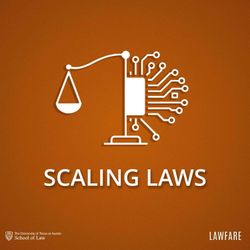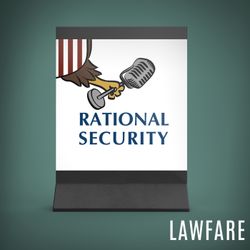Share

The Lawfare Podcast
Chatter: Water, Security, and Conflict with Peter Gleick
Water, essential to the emergence and endurance of life on Earth, has both spurred technological advances and driven many types of conflict. For the first time in humanity's long history with water, we are starting to suffer the consequences of widespread unsustainable water use, and we soon will face a crucial collective choice about what future generations' interactions with water will look like.
Hydroclimatologist Peter Gleick has studied the issues at the intersection of water, climate change, security, and conflict for decades; he recently wrote The Three Ages of Water to bring together much of his life's work on how water has shaped the course of human history and why acting now is so vital for fostering a sustainable hydrologic future. David Priess hosted him for a conversation covering his early interest in hydrology, the importance of interdisciplinary studies for water issues, early civilizations' relationship with water, ancient epic flood stories, early legal codes' attention to water conflict, the scientific revolution's water impacts, water poverty, the difference between so-called water wars and conflicts involving water, Hollywood's portrayals of water conflicts, NASA's GRACE satellites, the peak water debate, the path to a more sustainable future, and more.
Among the works mentioned in this episode:
The book The Three Ages of Water by Peter Gleick
The article "Water and Conflict: Fresh Water Resources and International Security," International Security (1993) by Peter Gleick
The article "Environment and Security: The Clear Connections," Bulletin of the Atomic Scientists (2015) by Peter Gleick
The book Bottled and Sold by Peter Gleick
The Water Conflict Chronology project at the Pacific Institute
The Water at the Movies compilation by Peter Gleick
The movie The Treasure of the Sierra Madre
The movie Mad Max: Fury Road
The movie Waterworld
The movie Quantum of Solace
The movie V is for Vendetta
The movie Dune (1984)
The book Dune by Frank Herbert
Chatter is a production of Lawfare and Goat Rodeo. This episode was produced and edited by Cara Shillenn of Goat Rodeo. Podcast theme by David Priess, featuring music created using Groovepad.
More episodes
View all episodes

Lawfare Daily: Can Minnesota Prosecute ICE Agent Jonathan Ross?
43:01|Senior Editor Anna Bower spoke with Carolyn Shapiro, co-director of Chicago-Kent College of Law's Institute on the Supreme Court, and Bryna Godar, a Staff Attorney with the State Democracy Research Initiative at the University of Wisconsin Law School. The discussion covered the state of Minnesota’s jurisdiction to criminally investigate Jonathan Ross, the ICE official who reportedly shot and killed Renee Nicole Good on Jan. 7. The conversation also covered obstacles state prosecutors might face in pursuing a potential prosecution and the likelihood that Ross could raise what’s known as “Supremacy Clause immunity."Bryna Godar’s article on the subject for Slate can be found here. Carolyn Shapiro’s Lawfare piece is available here.To receive ad-free podcasts, become a Lawfare Material Supporter at www.patreon.com/lawfare. You can also support Lawfare by making a one-time donation at https://givebutter.com/lawfare-institute.
Lawfare Daily: Trump's Board of Peace and What's Next for Gaza, with Joel Braunold
53:47|On today's episode, Lawfare Senior Editor Scott R. Anderson sits down with Joel Braunold, the managing director of The Center Project and a Lawfare contributing editor, to talk over the Trump administration's recently released plans for the Board of Peace tasked with implementing its peace plan for Gaza.Together, they discuss the details of the plan, how it intersects with the Trump administration's twenty-point peace plan, the state of international relations surrounding the ceasefire in Gaza, and what it can all tell us about what might come next. To receive ad-free podcasts, become a Lawfare Material Supporter at www.patreon.com/lawfare. You can also support Lawfare by making a one-time donation at https://givebutter.com/lawfare-institute.
Lawfare Daily: Grand Conspiracy with Molly Roberts
47:10|Lawfare Senior Editor Molly Roberts joins Editor in Chief Benjamin Wittes to discuss her new article on the so-called “grand conspiracy” investigation, which is now the subject of a grand jury probe in Florida. The “grand conspiracy” posits that a single conspiracy to foil President Trump’s electoral prospects binds together the Russia investigation from 2016, the Mar-a-Lago search, and the Jan. 6 and classified documents prosecutions during the Biden administration.To receive ad-free podcasts, become a Lawfare Material Supporter at www.patreon.com/lawfare. You can also support Lawfare by making a one-time donation at https://givebutter.com/lawfare-institute.
Lawfare Daily: The Trials of the Trump Administration, Jan. 16
01:35:16|In a live conversation on YouTube, Lawfare Editor in Chief Benjamin Wittes sat down with Lawfare Senior Editors Anna Bower, Roger Parloff, Michael Feinberg and Molly Roberts to discuss the investigation of Federal Reserve chair Jerome Powell, Senator Mark Kelly’s suit against the Department of Defense, Illinois and Minnesota’s lawsuits against the Department of Homeland Security over an increase in deployment of federal immigration enforcement agents, and more.You can find information on legal challenges to Trump administration actions here. And check out Lawfare’s new homepage on the litigation, new Bluesky account, and new WITOAD merch.To receive ad-free podcasts, become a Lawfare Material Supporter at www.patreon.com/lawfare.
Lawfare Archive: Content Moderation Comes for Parler and Gettr
57:19|From September 9, 2021: Let’s say you’re a freedom-loving American fed up with Big Tech’s effort to censor your posts. Where can you take your business? One option is Parler—the social media platform that became notorious for its use by the Capitol rioters. Another is Gettr—a new site started by former Trump aide Jason Miller.Unfortunately, both platforms have problems. They don’t work very well. They might leak your personal data. They’re full of spam. And they seem less than concerned about hosting some of the internet’s worst illegal content. Can it be that some content moderation is necessary after all?Today, we’re bringing you another episode of our Arbiters of Truth series on the online information ecosystem. Evelyn Douek and Quinta Jurecic spoke with David Thiel, the big data architect and chief technical officer of the Stanford Internet Observatory. With his colleagues at Stanford, David has put together reports on the inner workings of both Parler and Gettr. They talked about how these websites work (and don’t), the strange contours of what both platforms are and aren’t willing to moderate, and what we should expect from the odd world of “alt-tech.”To receive ad-free podcasts, become a Lawfare Material Supporter at www.patreon.com/lawfare. You can also support Lawfare by making a one-time donation at https://givebutter.com/lawfare-institute.
Lawfare Archive: The Trump Administration’s Latest Moves to Dismantle the Iran Nuclear Agreement with Peter Harrell and Richard Nephew
37:04|From June 8, 2020: On May 27, the Trump administration announced that it was withdrawing sanctions waivers that had allowed Russian, Chinese and European companies to work with Iran on sensitive Iranian nuclear sites in support of the goals of the 2015 Iran nuclear agreement. Margaret Taylor talked about what it really means with two experts: Peter Harrell, an attorney and adjunct senior fellow at the Center for a New American Security, and Richard Nephew, senior research scholar at the Center on Global Energy Policy at Columbia University. They talked about what has happened since the Trump Administration decided to withdraw from the Iran nuclear agreement in 2018 and what difficulties a new presidential administration may encounter in re-joining the agreement.To receive ad-free podcasts, become a Lawfare Material Supporter at www.patreon.com/lawfare. You can also support Lawfare by making a one-time donation at https://givebutter.com/lawfare-institute.
Scaling Laws: How AI Can Transform Local Criminal Justice, with Francis Shen
52:51|Alan Rozenshtein, research director at Lawfare, spoke with Francis Shen, Professor of Law at the University of Minnesota, director of the Shen Neurolaw Lab, and candidate for Hennepin County Attorney.The conversation covered the intersection of neuroscience, AI, and criminal justice; how AI tools can improve criminal investigations and clearance rates; the role of AI in adjudication and plea negotiations; precision sentencing and individualized justice; the ethical concerns around AI bias, fairness, and surveillance; the practical challenges of implementing AI systems in local government; building institutional capacity and public trust; and the future of the prosecutor's office in an AI-augmented justice system.Find Scaling Laws on the Lawfare website, and subscribe to never miss an episode.To receive ad-free podcasts, become a Lawfare Material Supporter at www.patreon.com/lawfare. You can also support Lawfare by making a one-time donation at https://givebutter.com/lawfare-institute.
Rational Security: The “Scare Them When They’re Young” Edition
01:17:22|This week, Scott sat down with his Lawfare colleagues Tyler McBrien, Michael Feinberg, and Ariane Tabatabai to talk through the week’s big news in national security, including:“Between Iraq and a Hard Place.” Iran is engaged in perhaps its most serious bout of domestic unrest in a decade, spurred on by a failing economy and the seeming political weakness of the regime after its devastating military conflict with Israel and the United States this past summer. But the regime has struck back viciously, cutting off global media and communications access even as it has engaged in a vicious and violent campaign of repression that may have already led to as many as between 2,000 and 12,000 fatalities. That has led, among other things, to threats from the Trump administration that it may intervene militarily against the regime. What should we be making of this development? What does it mean for the future of Iran, and what role might the United States play in that future?“A Slippery Slope.” ICE’s increasingly provocative immigration enforcement actions came to a violent head last week in Minneapolis, when ICE agent Jonathan Ross shot and killed driver and possible protest participant Renee Good. While the White House has sought to frame Good as a “domestic terrorist” who threatened Ross, videos of the incident instead suggest that her conduct came nowhere close to the standard normally required for the use of lethal force. The FBI is now reportedly investigating Good’s widow for ties to activist groups, an effort that led several career federal prosecutors to quit this week. How effective are the administration’s attempts to shape the truth likely to prove? “Green with Envy.” Diplomatic representatives from Denmark and Greenland are meeting with senior administration officials as we record to discuss a way forward on Greenland, the self-governing and all-but-independent Danish territory that President Trump has openly coveted since returning to office, up to and including the threat of military force to acquire it. How serious should the world take these threats? Where is the competition over Greenland likely to lead?In object lessons, Tyler is setting the mood with a recommendation of Way Dynamic’s album “Massive Shoe.” Mike is boosting our moods with a preview of “One Movie After Another,” a retrospective of Paul Thomas Anderson films, coming soon to the AFI Silver Theatre in Silver Spring. Scott is setting some mood lighting with his Xenomorph-like bedtime reading light from Glocusent. And Ari is getting moody with a revisit of Pedro Almodóvar’s “Pain and Glory.”To receive ad-free podcasts, become a Lawfare Material Supporter at www.patreon.com/lawfare. You can also support Lawfare by making a one-time donation at https://givebutter.com/lawfare-institute.
Lawfare Daily: Entrepreneurial Federalism and the New National Security, with Ashley Deeks and Kristen Eichensehr
42:36|On today's episode, Lawfare Senior Editor Scott R. Anderson sits down with Lawfare Contributing Editor Professor Ashley Deeks of the University of Virginia School of Law and Professor Kristen Eichensehr of Harvard Law School to discuss their recent article entitled, "Federalism and the New National Security," recently published in the Harvard Law Review.Together, they discuss the new ways that states are engaging in national security policy (which Deeks and Eichensehr call "entrepreneurial federalism"), the costs and benefits of such practices, and strategies for how the states and the various branches of the federal government should engage with them.To receive ad-free podcasts, become a Lawfare Material Supporter at www.patreon.com/lawfare. You can also support Lawfare by making a one-time donation at https://givebutter.com/lawfare-institute.